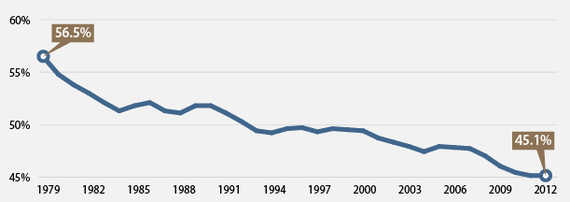James48843
TSP Talk Royalty
- Reaction score
- 907
[h=1]Goodbye, Middle Class[/h]Tue Dec 23, 2014, 08:23 AM
17 Things We Learned About Income Inequality in 2014
....5) Goodbye, Middle Class
The growing gulf in earnings between America’s richest and everyone else means that the group that's historically fallen in the middle, living a life of neither luxury or poverty, is shrinking. In 2013, median household income was $51,939, still eight percent lower than in 2007, the year before the recession started, according to Census data.
A recent report by the Center for American Progress shows that in 1979, a majority of American households (59.5 percent) had earnings that qualified them as middle class (defined as working-age households with incomes between 0.5 and 1.5 times the median national income). In 2012, the share of middle class families had fallen to 45.1 percent, indicating that American households have become more concentrated at the top and bottom of the earnings ladder.
Why is that a problem? For one thing, mobility: More of the middle class is migrating to the lower class due to stagnant incomes and the increasing cost of living—which means more Americans are struggling to make ends meet. That’s not just bad for families; it's bad for the economy. A recent study of income inequality at Washington University in St. Louis suggested that a depleted middle class can lead to a downturn in demand for goods and services, a bad outcome for businesses and the economy as a whole....

Read about it here:
17 Things We Learned About Income Inequality in 2014 - The Atlantic
Adding #8 too, since its pretty critical to understanding our "recovery" and why we're still hurting...
.#8--..Yes, the economy is picking up steam and employers are finally creating jobs. But that doesn’t mean that the jobs created are the jobs needed to spur economic growth.
Low-wage industries have added 3.8 million jobs since February 2010, although the industry lost just two million jobs during the recession, according a report from the National Employment Law Project. In the meantime, higher-wage industries have added just 2.6 million positions during the recovery, although they shed 3.6 million jobs during the recession.
Jobs in food service, retail stores, and temp firms are leading the recovery, according to the report–they accounted for 39 percent of private-sector employment gains in the past four years.
17 Things We Learned About Income Inequality in 2014
....5) Goodbye, Middle Class
The growing gulf in earnings between America’s richest and everyone else means that the group that's historically fallen in the middle, living a life of neither luxury or poverty, is shrinking. In 2013, median household income was $51,939, still eight percent lower than in 2007, the year before the recession started, according to Census data.
A recent report by the Center for American Progress shows that in 1979, a majority of American households (59.5 percent) had earnings that qualified them as middle class (defined as working-age households with incomes between 0.5 and 1.5 times the median national income). In 2012, the share of middle class families had fallen to 45.1 percent, indicating that American households have become more concentrated at the top and bottom of the earnings ladder.
Why is that a problem? For one thing, mobility: More of the middle class is migrating to the lower class due to stagnant incomes and the increasing cost of living—which means more Americans are struggling to make ends meet. That’s not just bad for families; it's bad for the economy. A recent study of income inequality at Washington University in St. Louis suggested that a depleted middle class can lead to a downturn in demand for goods and services, a bad outcome for businesses and the economy as a whole....

Read about it here:
17 Things We Learned About Income Inequality in 2014 - The Atlantic
Adding #8 too, since its pretty critical to understanding our "recovery" and why we're still hurting...
.#8--..Yes, the economy is picking up steam and employers are finally creating jobs. But that doesn’t mean that the jobs created are the jobs needed to spur economic growth.
Low-wage industries have added 3.8 million jobs since February 2010, although the industry lost just two million jobs during the recession, according a report from the National Employment Law Project. In the meantime, higher-wage industries have added just 2.6 million positions during the recovery, although they shed 3.6 million jobs during the recession.
Jobs in food service, retail stores, and temp firms are leading the recovery, according to the report–they accounted for 39 percent of private-sector employment gains in the past four years.
